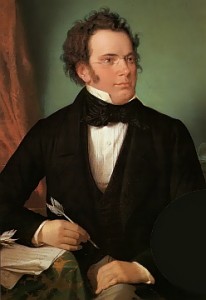Schubert/Liszt, Auf dem Wasser zu Singen

Our listening in the past two weeks has focused on songs without words and how the qualities of a song were incorporated into short character pieces for piano. And in the case of Tchaikovsky last week, we look at a transcription of his piano work into a violin-piano arrangement. Franz Liszt on the other hand took songs (with words) by Schubert and transcribed them for solo piano.
Unlike Mendelssohn who sought to capture the essence of song in a piano piece, Liszt brings Schubert’s song into the character of a work for piano. He employs the idioms of the piano. And in typical Liszt fashion, he makes it bigger and adds elements of virtuosity.
Liszt essentially invented the solo recital and dazzled everyone with his virtuosity, so it makes sense that he would want to take some of the most popular music of the time and make transcriptions that would show off what he and the piano could do. Schubert Lieder (songs) on the other hand are masterpieces of economy. Their intimacy and clarity are essential. Schubert was a great melodist, and that factor has attracted many efforts to transform his songs into a variety of instrumental forms. Liszt transcribed many of Schubert’s songs, but the result tends to be much more Liszt than Schubert.
Now compare that with Schubert’s song. Words are important (when they exist), so I encourage you to make reference to the words while listening to this performance. The piano accompaniment in Schubert’s songs is an important element of text painting. Notice how the piano figurations convey the “gently shimmering waves,” and how Liszt’s transcription changes that mood. He doesn’t quite turn it into a storm at sea, but it’s clearly something more than the gentle boat ride described in this song.



